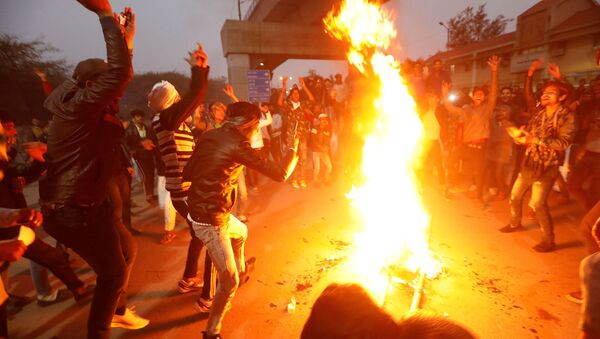As police used teargas and resorted to firing on Sunday night to disperse thousands of protestors, including students from Delhi’s leading Jamia Millia Islamia University, over 100 students and 35 police were injured. The protests are against a new law granting citizenship to illegal immigrants, except Muslims. A day later a student narrated what happened.
According to student protestor Unsa Khan, police used teargas over tolerable limits, detained many protestors and brutally assaulted them overnight.
“Rubber bullets were fired at students. Students have been beaten badly during the clashes. The police even entered the reading hall where students were studying,” said Khan.
“Girls ran towards dorms in self-defence, it seemed they [the police] were determined to hit girls. 60 to 70 students were taken into police custody. They were brutally beaten from six in the evening till three in the morning, resulting in multiple fractures. Students were beaten like animals. The night was horrific," Khan added.
In the neighbourhood of the university campus, protestors thought to have been local residents torched four public transport buses, and damaged several, bringing traffic on the main highway to a complete halt.
According to the Chief Proctor of JMI, Waseem Ahmed Khan, police entered the campus by force although permission was not given for them to do so.
— Sputnik (@SputnikInt) December 16, 2019
Condemning the violent charge by police against students, another student of the University Qazi Khadeeja said:
“Jamia is burning. The voice of youth is being suppressed. Due to the incident that happened yesterday, students are agitated and they want strict action.”
Women were scared, it was a peaceful protest, and Delhi Police unleashed barbarity on the students, Khadeeja noted.
“It is important to take strong steps against it and whole country has to unite. We are getting the support of Delhi University, JNU, IIT Bombay. It’s not only Jamia; Aligarh Muslim University was also targeted. Dorms were set on fire yesterday. You can see how youth is being targeted.”
Abusar Akhtar, a student at the Sanskrit department of Jamia University was studying at Dr. Zakhir Hussain Library in the campus when “police personnel entered the library”.
“Police broke the glass window of the library. The situation turned chaotic and everyone started to run around. Police surrounded the library and asked us to raise our hands in air and leave the room,” said Akhtar who had his head bandaged after being injured in yesterday's clashes.
According to his account, students were surrounded and thrashed by police. Even female students were not spared as they tried to escape the brutal assault. The library was badly vandalised by police and even a guard was beaten up. Police hurled abuse at the students and attacked the library guard, he claimed.
As the word spread, hundreds of students from New Delhi’s Jawharlal Nehru University (JNU) reached the Delhi Police headquarters in central Delhi and braved a chilly night on Sunday to take part in an "emergency" protest against the police action on JMI students.
[1/3] VIDEO: Protests raging outside Delhi police headquarters against citizenship law pic.twitter.com/lLrhEENE35
— Sputnik (@SputnikInt) December 15, 2019
Vice-President of JNU University Union, Saket Moon, told Sputnik on Monday, “We are united in solidarity with the students of JMI and support their protest against the Citizenship Amendment Act, which is against the principles of the constitution. The law grants citizenship on the basis of religion and not secular parameters.”
The Citizenship (Amendment) Act enacted last week grants citizenship to illegal immigrants from six religious minorities – Hindus, Parsis, Jains, Christians, Buddhists and Sikhs, but excludes Muslims from Afghanistan, Bangladesh and Pakistan, if they arrived in India prior to 2015.
Moon demanded the immediate release of detained students and condemned the entry by police onto the university premises and the unleashing of violence on them.
“We are sure the police weren't acting independently, but under the orders from higher authorities”, he said.
Delhi police, however, rejected charges of using excessive and disproportionate force against students at Jamia Millia Islamia. Police were pelted with stones, bulbs, tube lights and glass bottles. Action would be taken against students identified in riots, police claimed.
"The police did not fire upon any student. We are a professional force and used minimum force to control the situation," M.S. Randhawa, a Delhi Police spokesperson, said during a Monday news conference.


